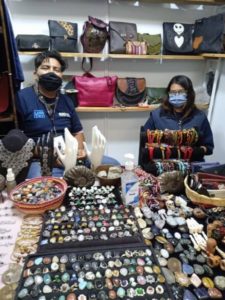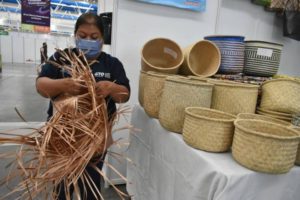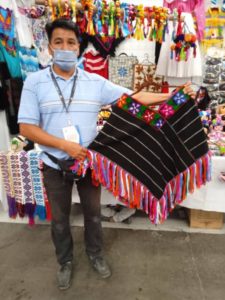Products from the Guanajuato Pavilion stand out for their attractiveness
News Category: News and Community News
-
In the four spaces of the Guanajuato Pavilion, you can find everything from handmade ponchos, which take almost two months to make, to backpacks made from river turtle shells.
From the Otomí culture stand out the alebrijes, the blouses of vibrant colors or even rag dolls, these last ones that people use a lot to give as gifts at weddings, informed the entrepreneur Felicitas Perea Atanacio, who has known how to make them since she was 13 years old.
In the place, there are from shawls and even queshqueme (better known as capes or ponchos) whose laborious process in which the sheep is sheared, the wool is washed twice, the product is taken to special machines to remove the children who then will be painted, the garment is made on a backstrap loom and finally embroidered with cross-stitch, so it can take up to 10 colors.
One of the most striking is Artesanías Quetzali, which has different earrings and necklaces, made with quartz, minerals, fossils, moonstone, agate, turquoise, geodes, obsidian, amber, chalcedony, among other things.

“This bag was made with the shell of torture that was found dead in a river, we put beef skin and a little crocodile skin to make it different,” explained Veronica Martinez from Guanajuato capital.
From San Miguel de Allende, the business called “Artesanías El Pájaro”, has figures in tin sheets, mirrors, lanterns, lamps, stars, and butterflies that are worth visiting.
The show could not miss the beautiful pet accessories, such as Greta Pets’ bandanas, collars, and handmade leashes, while the religious art from San Miguel de Allende has a special and mystical touch.

Undoubtedly the best pottery is from Tarandacua, where Javier Servin’s high-temperature pottery stands out, as well as the stippled pottery.
You can also find artisans such as Esperanza Cruz Cortés, from the Niuudavi artisans association, weaving a bag as she has been doing since she was six years old, so her unique skill stands out when creating her product.
From the Campo Toro wineries in Manuel Doblado, visitors can purchase the famous liquors, creams, tequila, rum, and gin. Visitors can also find handcrafted agave distillates (tequila or mezcal) from Silao, with eight labels that are already exported to Spain.

-


Leave a Reply